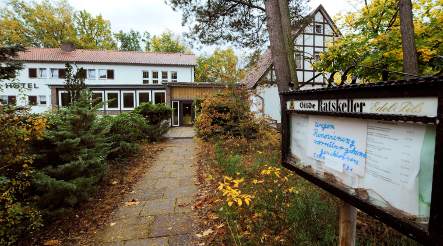The search at the Landhotel Gerhus in Faßberg near Celle turned up a telescopic club, pepper spray and several dummy weapons, but no real firearms, the authorities said. Parallel raids of apartments in Hannover and Rotenburg/Wümme found three starter pistols, a butterfly knife and brass knuckles.
Twelve individuals suspected of belonging to the far-right scene were present at the hotel during the raid. Four minors aged 15 to 17 were turned over to youth services.
Police have the hotel under surveillance to prevent a confrontation between the neo-Nazis, who occupied the building last month, and local residents.
The far-right extremists stormed the building on July 17 on behalf of the Hamburg lawyer and Holocaust denier Jürgen Rieger, who reportedly rented the unused hotel to turn it into a neo-Nazi training centre. But the property’s legal administrator claims they have no right to rent the hotel and wants to have them evicted.
Only hours after the raid, a court ruled the neo-Nazis could be legally removed from the premises.
The extremists then decided to end their almost three-week occupation of the building.



 Please whitelist us to continue reading.
Please whitelist us to continue reading.
Member comments